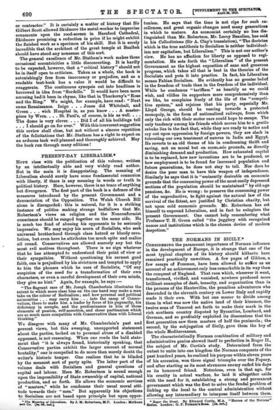PRESENT-DAY LIBERALISM.* HOPE rises with the publication of this volume,
written by an intellectually able and very widely read author. But in the main it is disappointing. The meaning of Liberalism should surely have some fundamental connexion with liberty, if there is any meaning in words or truth in political history. Here, however, there is no trace of anything but divergence. The first part of the book is a defence of the measures introduced by the present Government and a denunciation of the Opposition. The Welsh Church Bill alone is disregarded: this is natural, for it is a striking instance of politics making strange bedfellows that Mr. Robertson's views on religion and the Nonconformist conscience should be ranged together on the same side. He is much too fond of abusing his opponents to be seriously impressive. We may enjoy his scorn of Socialists, who seek universal brotherhood through class hatred or bloody revo- lution, but even here he attributes too much spite and malice all round. Conservatives are allowed scarcely any but the most evil motives throughout. There is no sign whatever that he has attempted to understand their point of view or their sympathies. Without questioning his earnest good faith, one is prejudiced by his strictures and tempted to apply to him the phrases which he uses of Socialists, "Of any suspicion of the need for a transformation of their own characters, or even a careful development of their own minds, they give no hint." Again, for example, he says :—
"The flagrant case of Mr. Joseph Chamberlain illustrates the extent to which mere class bias on the one hand may make a man take on the colour of Radicalism; and how personal and political animosities . . . may carry him . . . into the camp of Conser- vatism, there to make him a leader by force of his pugnacity, his deficiency in scruple, and the predominance in him of those elements of passion, self-assertion, and sheer partisanism which are so much more compatible with Conservative than with Liberal thinking."
We disagree with many of Mr. Chamberlain's past and present views, but this sweeping, unsupported statement about the parties, tacked on to personal abuse of a disabled opponent, is not reasoning. When one reads the bald state- ment that "it is always found, historically speaking, that Conservative parties exhibit the larger amount of normal brutality," one is compelled to do more than merely doubt the writer's historic temper. One realizes that he is blinded by the meanest sort of party spite. The latter part of the volume deals with Socialism and general questions of capital and labour. Here Mr. Robertson is sound enough upon the impossibility of State ownership of capital, national production, and so forth. He allows the economic services of "masters," while he condemns their usual moral atti- tude towards their "men." But apparently his objections to Socialism are not based upon principle but upon oppor-
• The Mcanea.ing of Liberalism.. By J. M. Robertson, M.P. London : Methuen snit Co. Ds. net.] tunism. He says that the time is not ripe for such ex- cellences, and great organic changes need many generations in which to mature. An economist certainly no less dis- tinguished than Mr. Robertson, Mr. Leroy Beaulieu, has said in his Collectivisme (Sir A. Clay's translation), "The doctrine which is the true antithesis to Socialism is neither individual- ism nor capitalism, but Liberalism." This is not our author's view. He has no affection for liberty as opposed to regi- mentation. He sets forth the "Liberalism" of the present Government as the highest exposition of sane and generous progress, which takes all that is best in the theories of the Socialists and puts it into practice. In fact, his Liberalism means Fabian Socialism. He evidently has no greater belief in the freedom of trade than in the freedom of the individual. While he condemns " tariffism " as heartily as we could wish, and vilifies its supporters more comprehensively than we like, he complains freely of the ills of the "competi- tive system," and rejoices that his party, especially Mr. Lloyd George, should be veering towards a protected monopoly, in the form of nationalized railways, from which only the rich with their motor cars could hope to escape. The only tendency among his friends which moves him to a gentle rebuke lies in the fact that, while they are ready to notice and cry out upon oppression by foreign powers, they are slack in tolerating our own treatment of natives in India and Egypt. He reverts to an old theme of his in condemning thrift and saving, not on moral but on econumic grounds, as directly diminishing demand and production. How exhausted capital is to be replaced, how new inventions are to be produced, or how employment is to be found for increased population and future generations, he does not stay to tell. Nor does he desire the poor man to have this weapon of independence. Similarly he says that it is "eminently desirable on economic grounds that the consuming power of the most easily depressed sections of the population should be maintained" by old-age pensions, &c. He is wrong : to preserve the consuming power of the unproductive, to fight against the natural law of the survival of the fittest, are justified by Christian charity, but not upon cold economic grounds. Mr. Robertson has set himself to expound Liberalism, and in fact he eulogizes the present Government. One cannot help remembering what Professor T. H. Green called "the jugglery with recognized names and institutions which is the chosen device of modern despotism."


























































 Previous page
Previous page